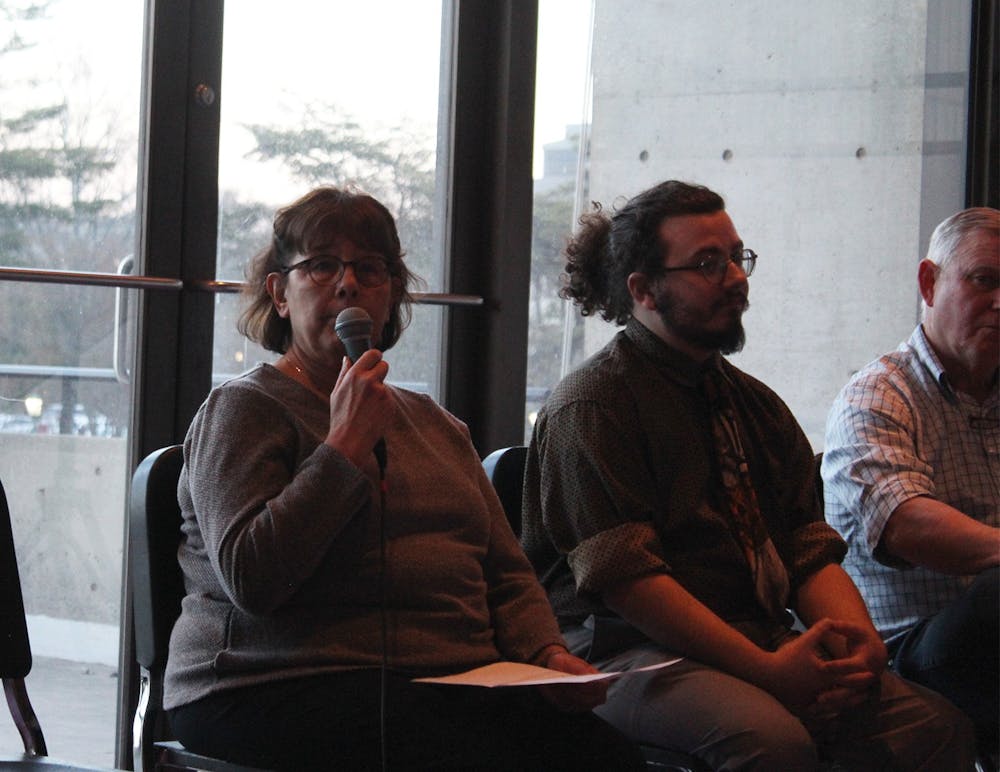The Jacobs School of Music Health & Wellness Committee presented a panel of representatives from the Jewish community on March 7 at the Musical Arts Center. They emphasized the importance of keeping the memory of the Holocaust and its victims alive.
The panel, moderated by Director of Hillel House Rabbi Sue Laikin Silberberg, featured professor of orchestral conducting Arthur Fagen and Jacobs School of Music student Yoav Hayut. Featured guests were Avishay Hayut and Phil Barr, members of “The Generations After,” an organization formed by children of Holocaust survivors.
Silberberg opened the panel by talking about the “Anne Frank” opera which had made its first ever premiere at the Musical Art Center on March 3. Silberberg said that an important factor about the opera was how it served as a reminder of how and why the Holocaust happened.
“Something I’ve really come to believe over the last several years — and this opera really brought it home to me — is that it’s not enough just to remember,” Silberberg said. “We have to understand how it happened and how the bystander behavior allowed the Holocaust to happen.”
Related: [‘Anne Frank’ premieres with Jacobs School of Music Friday]
Yoav Hayut, a third generation from Holocaust survivors, further emphasized the negative repercussions of bystander behavior — explaining that only through strength of unity could such a tragedy never happen again.
“It could always happen again; we just need to be together and always think and be there for each other and be kind people,” Hayut said. “Never let our heritage be something that’s looked down upon. We need to be connected and humane to each other.”
The panel discussed how one way of reinforcing that unity among all people was to share stories of Holocaust survivors and victims to find a spirit of hope and courage — to preserve it in the hardest of times. Fagen said that he used his own career as a conductor to share Holocaust stories.
“I felt it was always my obligation as a musician to at least keep the memory of the Holocaust alive by programming works of Holocaust composers and works related to the Holocaust for well over 20 years,” Fagen said.
As the number of Holocaust survivors still alive goes down, Silberberg talked about the duty of the living to ensure their stories never died. Avishay Hayut, whose family went through the Holocaust, shared an excerpt he had written for a collection of second-generation pieces surrounding the Holocaust entitled, “The Ones Who Remember.”
“We can never recover the whole truth of what happened to our family members lost during the Holocaust,” Hayut said. “Yet those of us who come after often feel compelled to seek to unearth their stories from the broken glass and charred embers even though we may become scarred with emotional cuts and burns too.”
Related: [John Mellencamp reflects on his career at IU symposium honoring his legacy]
Silberberg asked the panel how people could do better in order to move forward in a positive manner. Yoav Hayut said before moving forward people must first truly care and help one another.
“If we continue to do nothing, that’s where we end up running into problems,” Hayut said. “We need to not think for, but about each other and be a world that cares. Otherwise, we lose that care and turn to indifference and that allowed the Holocaust to happen.”
Silberberg concluded the panel with a Hebrew quote, reminding everyone of the importance of engaging in the work to be better, no matter how small the act the difference would be remarkable.
“We each have a responsibility to do that, even though we know we may never complete the work,” Silberberg said. "We have to engage in the work of understanding and caring and creating community to never let something like this happen again.”




